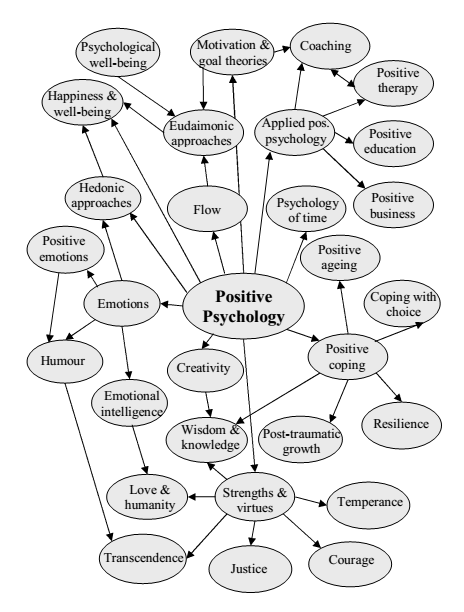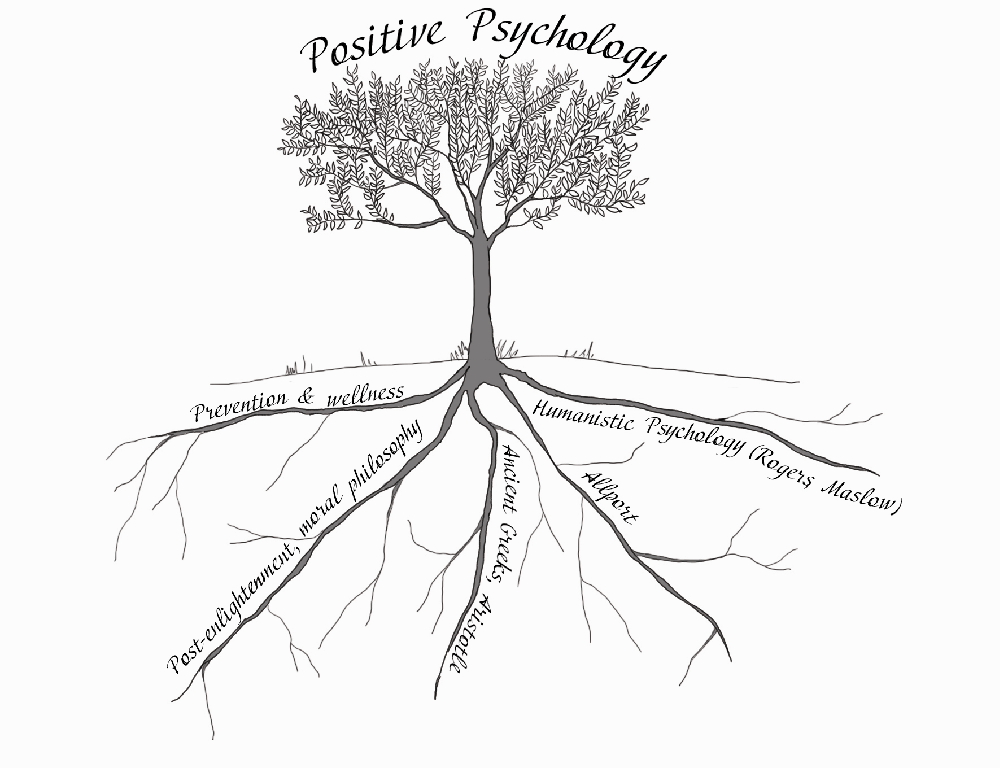Positive Psychology
“Persons are judged to be great because of the positive qualities they possess, not because of the absence of faults.”
— John Fitzgerald
What is Positive Psychology?
Positive Psychology emerged late in the 20th century, and was borne out of an observation made by Martin Seligman, the then president of the American Psychological Association, regarding the apparent imbalance of focus within the field of psychology. Seligman recognised that psychology had focused almost exclusively on illness and pathology. This discrepancy can be highlighted by doing a simple search on any one of the main academic search engines using the words “sadness” vs “happiness”. Chances are you will find a ratio of around 100:1 in favour of sadness. Psychology had been ignoring the upper end of the human experience – wellbeing and thriving – and had instead been focusing on surviving.
In reaction to this discrepancy, Seligman advocated for research into “positive emotions, character traits & enabling institutions” (Seligman & Cziksentmihalyi, 2000). Since the taboo has been lifted on research relating to the positive aspects of human existence, an abundance of research interest has been generated, resulting in significant scientific advancements in a relatively short period of time.
TED talk with Dr Martin Seligman on Positive Psychology
Essentially positive psychology can be described as the scientific study of what enables individuals and communities to VITALISE. It is important to emphasise the word scientific, as there has been many “gurus” who proclaim to know the secret to happiness. Positive psychology is different in that it has used rigourous scientific methods to investigate happiness and wellbeing, as a means of making valid and reliable discoveries (more on this below).
Positive Psychology is now used as an umbrella term to group all the topics in psychology that are in some way related to wellbeing, happiness, and excellence. This means that many topics in psychology (e.g. self-esteem) could theoretically be considered part of the broader umbrella term of positive psychology, which can make things confusing (the concept map below illustrates this nicely). Despite complexities, Positive Psychology is making significant advancement in the science of happiness and wellbeing, and much of which can be applied in our lives to enhance our personal and community wellbeing.

Adapted from “Positive Psychology in a Nutshell” by Ilona Boniwell (2008)
Myths and Criticisms of Positive Psychology
Positive psychology has not been universally accepted by all within the field of psychology. Much of the criticism however comes from a misunderstanding of positive psychology, and therefore it is important to address some of the key criticisms and myths relating to positive psychology:
- “Positive Psychology ignores the negatives”: Positive psychology is NOT a ‘Pollyanna’ approach. It recognises that difficult emotions have a place, and understands the importance of listening to and experiencing negative emotions. Happiness and wellbeing are not seen as the absence of negative emotions, but the addition of positive states (e.g. meaning, vitality, life satisfaction, etc.).
- “Positive Psychology is ALL New”: Despite much new research, it is important to recognise the historical roots of positive psychology. Although psychology has predominantly focused on the negative, there has been small pockets of research into the positive aspects of the human experience. Furthermore, other fields such as philosophy, have been investigating happiness and wellbeing for many years. Therefore, it is important to recognise that positive psychology has emerged from these historical foundations, as illustrated by the picture below.

Image from “Positive Psychology in a Nutshell” by Ilona Boniwell (2006)
Positive Psychology Key Findings
So what has positive psychology found so far, and how can this be applied in your life to help you be happier? Below are some of the key areas of positive psychology (click to view information about the area, some of the key research findings, and how you can apply it in your life COMING SOON)
- Character Strengths
- Mindfulness
- Savouring
- Growth Mindset
- Gratitude
- Flow
- Meaning and Purpose in Life
- Positive Relationships
- Broaden and Build
- Optimism and Hope
- Kindness
If you want to learn more about applying Positive Psychology in your life, contact Vitalise today and make an appointment to see one of our psychologists.
Resources
Websites
-
Making Australia Happy: This is the webpage of the recent Australian show “Making Australia Happy” and includes valuable information about how to improve your wellbeing.
-
Authentic Happiness: This has long been the ‘go to’ website for all things positive psychology. Here you can access all of the leading positive psychology tools, participate in research and learn about current research from Seligman himself.
-
Positive Psychology UK: This is a UK based website that focuses on leading positive psychology researchers and their findings.
-
International Positive Psychology Association: This website is dedicated to researchers in positive psychology, however does also have details of Positive Pychology related conferences which are available to the public.
-
CAPP: This website illustrates how positive psychology can be applied in a business environment
Books
-
Flourish, by Martin Seligman
-
Authentic Happiness, by Martin Seligman
-
The How of Happiness, by Sonia Lyubomirsky
-
The Happiness Trap, by Russ Harris
-
Curious, by Todd Kashdan
Journals
Videos
Dr Ronald Siegel speaking about ‘What it Takes to be Happy’
